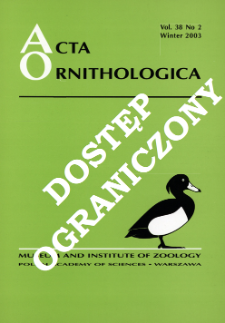- Search in all Repository
- Literature and maps
- Archeology
- Mills database
- Natural sciences
Advanced search
Advanced search
Advanced search
Advanced search
Advanced search

Object
Title: Nest-site selection in the magpie Pica pica in a high-density urban population of Sofia (Bulgaria)
Subtitle:
Acta Ornithologica, vol. 37, no. 2 ; Wybiórczość miejsc gniazdowych u sroki w warunkach wysokiego zagęszczenia miejskiej populacji w Sofii
Contributor:
Polska Akademia Nauk. Muzeum i Instytut Zoologii
Publisher:
Muzeum i Instytut Zoologii PAN
Place of publishing:
Description:
Bibliogr. p. 65 ; P. [55]-66 : ill. ; 27 cm ; Abstract in Polish. Taxa in Latin
Type of object:
Abstract:
The study was carried out in 1999-2000 in a 405 ha area urban habitat and revealed one of the highest densities (56.8 pairs/km2) for the species. Breeding density was best predicted by the diversity of trees in the plot and was not limited by the presence of tall trees. Birds used 69% of the available tree species and preferentially selected half of them. Taller tree species were preferred to shorter ones and coniferous trees were preferred to broadleaved ones. Nests higher above the ground were more likely to be successful than nests lower down. The greater the nest height, the earlier the Magpies laid eggs and the more fledglings they produced. Pairs nesting in conifers laid earlier than those in broadleaved trees but there were no significant differences in clutch-size, hatching or fledging success between the two habitats. The nest site preference was not well explained by the success rate. Regardless of species, not only tall trees, where success was greater, were preferred but also smaller ones, despite the lower success rate. Nests in conifers were no more successful than those in broadleaved trees, despite the marked preference for conifers. Magpies that succeeded in their final breeding attempts in one season were less likely to make a contrasting nest-site choice the following season. The lack of a clear adjustment between the nest-site selection pattern and breeding success was hypothesized to be due to two non-exclusive mechanisms: 1) either there are no strong selective pressures at any type of nest-site and on the behavioral plasticity of Magpies or else selective pressures may change during the season; 2) the dependence of nest-site selection on bird quality.
Relation:
Volume:
Issue:
Start page:
End page:
Detailed Resource Type:
Format:
Resource Identifier:
Source:
MiIZ PAN, call no. P.257-37-2 ; MiIZ PAN, call no. P.4568-37-2 ; click here to follow the link
Language:
Rights:
Rights Reserved - Restricted Access
Terms of use:
Digitizing institution:
Museum and Institute of Zoology of the Polish Academy of Sciences
Original in:
Library of the Museum and Institute of Zoology of the Polish Academy of Sciences
Projects co-financed by:
Programme Innovative Economy, 2010-2014, Priority Axis 2. R&D infrastructure ; European Union. European Regional Development Fund
Access:
Object collections:
- Digital Repository of Scientific Institutes > Partners' collections > Museum and Institute of Zoology PAS > Scientific Journals
- Digital Repository of Scientific Institutes > Partners' collections > Museum and Institute of Zoology PAS > MIZ PAN Publications > Acta Ornithologica
- Digital Repository of Scientific Institutes > Literature > Journals/Articles
Last modified:
Feb 4, 2025
In our library since:
Jun 10, 2014
Number of object content downloads / hits:
44
All available object's versions:
https://rcin.org.pl/publication/55573

 INSTYTUT ARCHEOLOGII I ETNOLOGII POLSKIEJ AKADEMII NAUK
INSTYTUT ARCHEOLOGII I ETNOLOGII POLSKIEJ AKADEMII NAUK
 INSTYTUT BADAŃ LITERACKICH POLSKIEJ AKADEMII NAUK
INSTYTUT BADAŃ LITERACKICH POLSKIEJ AKADEMII NAUK
 INSTYTUT BADAWCZY LEŚNICTWA
INSTYTUT BADAWCZY LEŚNICTWA
 INSTYTUT BIOLOGII DOŚWIADCZALNEJ IM. MARCELEGO NENCKIEGO POLSKIEJ AKADEMII NAUK
INSTYTUT BIOLOGII DOŚWIADCZALNEJ IM. MARCELEGO NENCKIEGO POLSKIEJ AKADEMII NAUK
 INSTYTUT BIOLOGII SSAKÓW POLSKIEJ AKADEMII NAUK
INSTYTUT BIOLOGII SSAKÓW POLSKIEJ AKADEMII NAUK
 INSTYTUT CHEMII FIZYCZNEJ PAN
INSTYTUT CHEMII FIZYCZNEJ PAN
 INSTYTUT CHEMII ORGANICZNEJ PAN
INSTYTUT CHEMII ORGANICZNEJ PAN
 INSTYTUT FILOZOFII I SOCJOLOGII PAN
INSTYTUT FILOZOFII I SOCJOLOGII PAN
 INSTYTUT GEOGRAFII I PRZESTRZENNEGO ZAGOSPODAROWANIA PAN
INSTYTUT GEOGRAFII I PRZESTRZENNEGO ZAGOSPODAROWANIA PAN
 INSTYTUT HISTORII im. TADEUSZA MANTEUFFLA POLSKIEJ AKADEMII NAUK
INSTYTUT HISTORII im. TADEUSZA MANTEUFFLA POLSKIEJ AKADEMII NAUK
 INSTYTUT JĘZYKA POLSKIEGO POLSKIEJ AKADEMII NAUK
INSTYTUT JĘZYKA POLSKIEGO POLSKIEJ AKADEMII NAUK
 INSTYTUT MATEMATYCZNY PAN
INSTYTUT MATEMATYCZNY PAN
 INSTYTUT MEDYCYNY DOŚWIADCZALNEJ I KLINICZNEJ IM.MIROSŁAWA MOSSAKOWSKIEGO POLSKIEJ AKADEMII NAUK
INSTYTUT MEDYCYNY DOŚWIADCZALNEJ I KLINICZNEJ IM.MIROSŁAWA MOSSAKOWSKIEGO POLSKIEJ AKADEMII NAUK
 INSTYTUT PODSTAWOWYCH PROBLEMÓW TECHNIKI PAN
INSTYTUT PODSTAWOWYCH PROBLEMÓW TECHNIKI PAN
 INSTYTUT SLAWISTYKI PAN
INSTYTUT SLAWISTYKI PAN
 SIEĆ BADAWCZA ŁUKASIEWICZ - INSTYTUT TECHNOLOGII MATERIAŁÓW ELEKTRONICZNYCH
SIEĆ BADAWCZA ŁUKASIEWICZ - INSTYTUT TECHNOLOGII MATERIAŁÓW ELEKTRONICZNYCH
 MUZEUM I INSTYTUT ZOOLOGII POLSKIEJ AKADEMII NAUK
MUZEUM I INSTYTUT ZOOLOGII POLSKIEJ AKADEMII NAUK
 INSTYTUT BADAŃ SYSTEMOWYCH PAN
INSTYTUT BADAŃ SYSTEMOWYCH PAN
 INSTYTUT BOTANIKI IM. WŁADYSŁAWA SZAFERA POLSKIEJ AKADEMII NAUK
INSTYTUT BOTANIKI IM. WŁADYSŁAWA SZAFERA POLSKIEJ AKADEMII NAUK




































